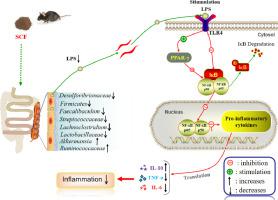Phytomedicine ( IF 7.9 ) Pub Date : 2021-09-05 , DOI: 10.1016/j.phymed.2021.153728 Xin Li 1 , Lulu Chu 1 , Shanshan Liu 1 , Wenkai Zhang 1 , Lezhen Lin 1 , Guodong Zheng 1

|
Background
Smilax china L., a traditional Chinese herb, has been used to treat various inflammatory disorders, particularly pelvic inflammation. The anti-inflammatory activity of the plant extract has been reported in several in vivo experimental models. However, the underlying anti-inflammatory mechanisms and the role of gut microbiota in mice on Smilax china L. flavonoid (SCF) treatment are poorly understand.
Purpose
To investigate the role of SCF in providing the anti-inflammatory response and the role of gut microbiota in high-fat/high-sucrose (HFHS)-induced obese mice for 12 weeks.
Study design and methods
C57BL/6J mice were randomly divided into seven groups, normal chow (NC), HFHS, Orlistat, SCE, and low-, medium-, high- doses of SCF for 12 weeks. The body weight, liver weight, serum concentrations of lipopolysaccharide (LPS), and inflammatory cytokines in mice were assessed. The gene and protein expression levels of inflammation-related markers were measured by qRT-PCR and Western blot. Finally, the composition of gut microbiota was detected by analyzing 16S rDNA gene sequences.
Results
SCF supplement reduced body weight gain, adipose tissue and liver indexes, attenuated serum levels of tumor necrosis factor (TNF)-α, interleukin (IL)-6, LPS, and increased IL-10, and adiponectin. SCF significantly reduced the mRNA expression levels of TNF-α, IL-6, and increased the expression of AMPK, PPAR-γ, and IL-10 in mice's liver and adipose tissues. In addition, the TLR4, p-IκBα, NF-κB, and p65 protein expression levels were reduced after the SCF supplement. Moreover, SCF treatment ameliorated HFHS-induced gut dysbiosis, as revealed by an increased intestinal barrier protective species (Akkermansia spp). The relative abundance of Streptococcaceae, Faecalibaculum, and endotoxin-producing Desulfovibrionaceae were significantly decreased on SCF supplements.
Conclusion
The results showed that SCF effectively inhibits HFHS-induced inflammation by suppressing the LPS-producing bacteria and pro-inflammatory bacteria group. Furthermore, the abundance of gut barrier protective species Akkermansia spp was increased to alleviate inflammatory response, inhibiting the LPS-TLR4/NF-κB signaling pathway. Thus, SCF may be a promising prophylactic for diet-induced inflammatory diseases through the gut-liver axis in mice.
中文翻译:

菝葜黄酮通过调节小鼠肠肝轴减轻 HFHS 诱导的炎症
背景
菝葜是一种传统中草药,已用于治疗各种炎症性疾病,特别是盆腔炎。植物提取物的抗炎活性已在多个体内实验模型中得到报道。然而,人们对菝葜黄酮类化合物 (SCF) 治疗小鼠的潜在抗炎机制和肠道微生物群的作用知之甚少。
目的
旨在研究 SCF 在高脂肪/高蔗糖 (HFHS) 诱导的肥胖小鼠 12 周中提供抗炎反应的作用以及肠道微生物群的作用。
研究设计和方法
C57BL/6J小鼠被随机分为七组,正常饲料(NC)组、HFHS组、奥利司他组、SCE组以及低、中、高剂量的SCF组,为期12周。评估小鼠的体重、肝脏重量、脂多糖(LPS)血清浓度和炎症细胞因子。通过qRT-PCR和Western blot检测炎症相关标志物的基因和蛋白表达水平。最后,通过分析16S rDNA基因序列检测肠道微生物群的组成。
结果
SCF 补充剂可减少体重增加、脂肪组织和肝脏指数,降低肿瘤坏死因子 (TNF)-α、白细胞介素 (IL)-6、LPS 的血清水平,并增加 IL-10 和脂联素。SCF显着降低小鼠肝脏和脂肪组织中TNF-α、IL-6的mRNA表达水平,并增加AMPK、PPAR-γ和IL-10的表达。此外,补充 SCF 后,TLR4、p-IκBα、NF-κB 和 p65 蛋白表达水平降低。此外,肠道屏障保护物种( Akkermansia spp)的增加表明,SCF 治疗可改善 HFHS 引起的肠道生态失调。补充 SCF 后,链球菌科、粪杆菌科和产生内毒素的脱硫弧菌科的相对丰度显着降低。
结论
结果表明,SCF通过抑制LPS产生菌和促炎菌群,有效抑制HFHS引起的炎症。此外,肠道屏障保护物种Akkermansia spp的丰度增加,可减轻炎症反应,抑制 LPS-TLR4/NF-κB 信号通路。因此,SCF 可能是一种有前途的预防小鼠肠道-肝轴饮食诱发炎症性疾病的方法。



























 京公网安备 11010802027423号
京公网安备 11010802027423号